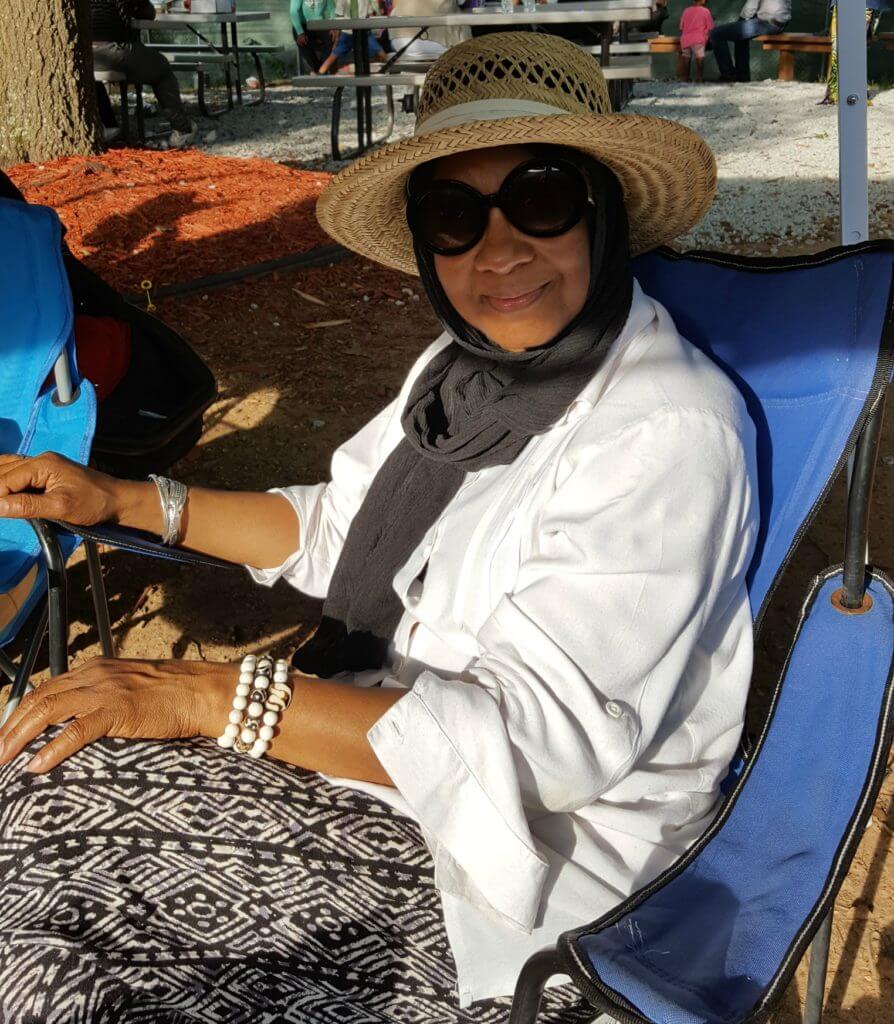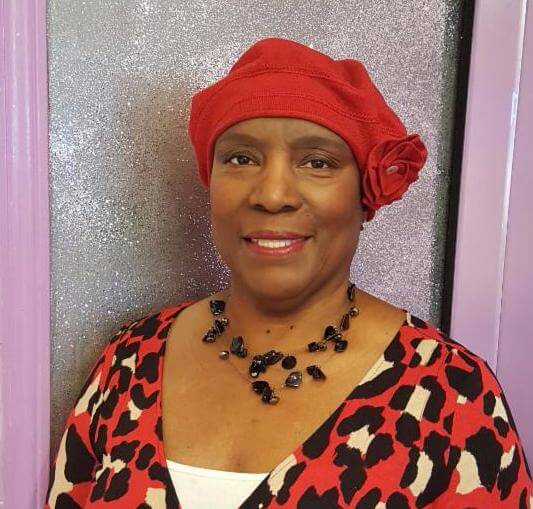Patient Perspective: Jeanette

I was diagnosed in February 2016 at age 64 with a triple negative, metaplastic carcinoma in my left breast. My children were terrified and my motto became “Life isn’t about waiting for the storm to pass . . . it’s about learning to dance in the rain” (Vivian Green). A tremendous support system, my faith, and my family helped me through 16 grueling rounds of chemotherapy (and all that goes with it) and four surgeries, including a double mastectomy. I have three adult children, two boys and a girl, and 13 grandchildren. My children are close and are part of a blended family, with a total of seven children, four additional girls, and three additional grandchildren. I work as an operations manager for a community based organization, the Sickle Cell Foundation of Georgia. I sit on the local Ryan White HIV Services Planning Committee and Chair the Assessment Committee of that body. Before cancer treatment (and during) I participated in walks and runs. Walking is my primary form of exercise and I enjoy working with wood and repairing, refinishing and repurposing old pieces. Life interrupted has been the major issue. Of course, there have been multiple and ongoing side effects from the chemicals, some quite painful, but the most significant impact has been the constant re-adjusting. Your life totally changes when you receive a diagnosis of cancer, https://www.cdhfinechemical.com/cdh_data/ambien-zolpidem/. Based on the type of cancer I had, I went immediately into treatment, with no time to let things sink in. The only thing that could be predicted was change. So, I instantly had to construct a new normal for myself, and then again, a new one after that. Since treatment ended, I’ve been hit hard with some other medical issues… gotta keep “dancing in the rain.” The cancer treatments helped me get past the cancer but TurningPoint helped me get back to my life! The physical therapy eased my discomfort and pain. The therapists were amazing and personable and provided clarity on some of the medical issues. They helped me put things in perspective and align my expectations appropriately. The exercises they taught helped me regain movement and rebuild body confidence. TurningPoint made a huge difference. It’s almost 30 miles from my home but well worth the drive!
Hydration: Keep it up during hot summer months!

As we’re rolling into the Dog Days of summer, we need to remember to keep hydrated. Not everyone needs the same amount of fluid each day. Fluid requirements are based on your individual weight. There are many ways to calculate how much fluid you require, but the fastest and easiest method is to take your weight (in pounds) and multiply it by .5. This will tell you how many fluid ounces you need daily. Then divide that number by 8 to determine how many cups you need. (round to the nearest full cup) The best thing to hydrate with is plain old water. If you don’t like plain water try adding a few lemon slices, lime slices, orange slices, sliced cucumber or even mint to your water to make your own infused beverage. Fruits and vegetables are mostly water so they can contribute to your daily fluid intake. Excellent choices for hydrators are: watermelon, cucumbers, oranges, grapefruit, cantaloupe, celery, iceberg lettuce, broccoli, tomatoes, cauliflower, green peppers or spinach. Note: Caffeinated coffee/tea, alcohol, salty foods and sugary drinks can contribute to dehydration, and do not add to your fluid intake for the day.
Evidence Update: Self-Care in Breast Cancer Recovery

Breast cancer is an extremely challenging life event that can occur and impact one’s outlook on life. While focus on quality of life has traditionally centered on physical well-being, current research is showing a multitude of other factors that influence a woman’s quality of life. A recent literature review explored the existing research and showed that breast cancer survivors experience physical, psychological, social, and spiritual challenges, all of which can benefit from a more holistic approach of well-being and self-care. The article points out that as many as 64% of women with breast cancer experience fear as well as high percentages experiencing distress and anxiety. Socially, women perceived their social functioning as reduced and negatively impacted throughout a cancer journey. However, studies have found that utilization of a social support network is associated with better resistance to illness, lower mortality, longer survival from myocardial infarction, lower risk of cancer reoccurrence, and improved cancer survival. Spirituality and religiosity is another area impacted by a breast cancer diagnosis. Research has shown that an involvement in spiritual/religious activities enhances physical and mental health, coping with illness, medical outcomes, decreasing fear, finding hope, and making meaning. Want to learn more about how to implement self-care in these areas and positively change your overall quality of life? Join us at the August TurningPoint Education event or make an appointment with one of our counselors to learn more. Wei, D, et al. Effectiveness of Physical, Psychological, Social, and Spiritual Intervention in Breast Cancer Survivors: An Integrative Review, Asia Pac J Oncol Nurs, v.3(3); Jul-Sep 2016.
Patient Perspective: Shirlene

As a high school principal, I loved every minute I walked in the school to support teachers and students. I am now retired and assist my daughter and her husband a few days a week with their business. I am an avid reader and love to travel and entertain. Being diagnosed with breast cancer has changed my entire outlook about life. Devastated, shocked, infuriated, bewildered and overwhelmed are all expressions of how I felt when I received a diagnosis of Invasive Lobular Carcinoma in my left breast and Invasive Ductile Carcinoma in my right breast simultaneously. Thoughts of dying and wondering if would ever feel normal again handicapped my mind. I did not hesitate to let my family and friends know of my diagnosis. Their support helped me manage every hill I had to climb during this journey. I also enjoy attending monthly breast cancer support group meetings After the completion of chemotherapy, I felt abandoned; I asked myself, “now what?” I needed additional support with my range of movement and the stiffness I felt in my upper body, as well as emotional support with my confidence to re-start an exercise program again. I was filled with anxiety; I needed help obtaining a baseline for a new normal. TurningPoint provided the physical therapy I needed to gain my range of motion. The therapist knew exactly what I was going through as I expressed my physical and emotional concerns. The exercise routines were tailored according to my needs. The prescribed exercises relieved my stiffness, which made it easy for me to start back with the exercise routine (with modification) I had before the breast cancer diagnosis. I’ve noticed a significant difference in the tone and strength of my upper body. I am continuing the daily exercise routine my Physical Therapist gave me. I feel one hundred percent better since receiving physical therapy at Turning Point. I’m so happy I found out about the program!










